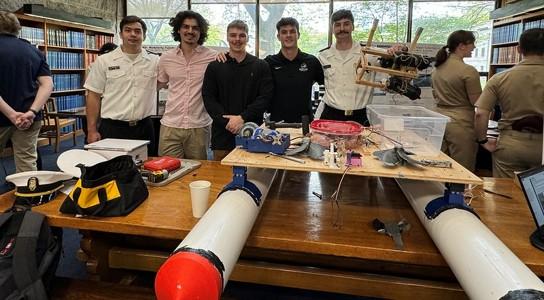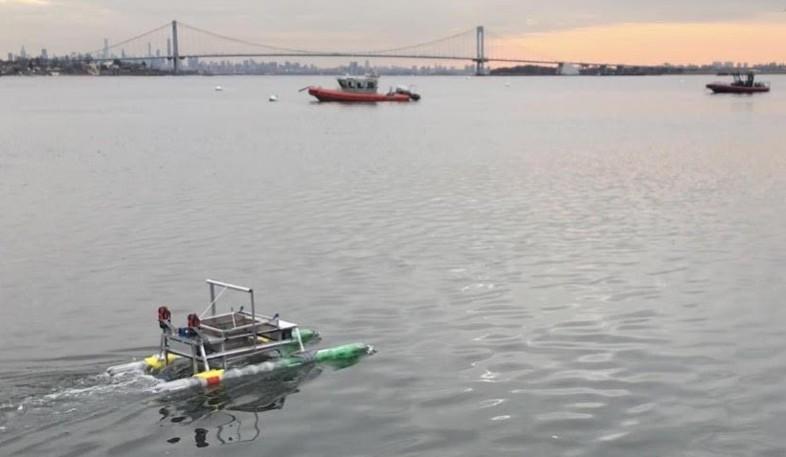
Mechanical Engineering at Maritime College is focused on the design of mechanical components and systems, to ensure that they operate correctly and are sufficiently robust.

Accreditation
The Mechanical Engineering program is accredited by the Engineering Accreditation Commission of ABET, under the commission's General Criteria and Program Criteria for Mechanical Engineering.
Academic Program
The Mechanical Engineering program requires a firm foundation in applied mechanics, mathematics, fluid mechanics, electrical engineering, and a practical, tangible orientation for design. Mechanical Engineering was the third of the three programs approved by the New York State Education Department in 2002. Learning in Mechanical Engineering goes well beyond the classroom. You will spend your time in labs, designing, building and testing mechanisms and machinery.
Degree Awarded
Bachelor of Engineering
Professional Experiences Available
- U.S. Coast Guard Engine License
- Intern Option
See the Career Options and Educational Pathways tab for more information.
Degree Curricula and Flowcharts
The Mechanical Engineering Degree Curricula and Pre-Requisite Flowcharts may be found at the link below.
Degree Curricula and Flowcharts
Program Educational Objectives
The objectives of this program are for graduates to:
- become engineers who have the ability to practice the design, service, or operation of mechanical systems, and
- have the ability to take professional leadership positions that require an extensive engineering background
Student Outcomes
Mechanical Engineering graduates of Maritime College will possess:
- an ability to identify, formulate, and solve complex engineering problems by applying principles of engineering, science, and mathematics
- an ability to apply engineering design to produce solutions that meet specified needs with consideration of public health, safety, and welfare, as well as global, cultural, social, environmental, and economic factors
- an ability to communicate effectively with a range of audiences
- an ability to recognize ethical and professional responsibilities in engineering situations and make informed judgments, which must consider the impact of engineering solutions in global, economic, environmental, and societal contexts
- an ability to function effectively on a team whose members together provide leadership, create a collaborative and inclusive environment, establish goals, plan tasks, and meet objectives
- an ability to develop and conduct appropriate experimentation, analyze and interpret data, and use engineering judgment to draw conclusions
- an ability to acquire and apply new knowledge as needed, using appropriate learning strategies.
Mechanical Engineering Enrollment and Degree Data
Calendar Year | 1st Enrollment Year | 2nd Enrollment Year | 3rd Enrollment Year | 4th Enrollment Year | 5th Enrollment Year | B.E. Degrees Awarded |
|---|---|---|---|---|---|---|
| 2023 | 68 | 46 | 50 | 43 | 12 | 51 |
| 2022 | 71 | 60 | 69 | 39 | 13 | 56 |
| 2021 | 85 | 93 | 58 | 44 | 5 | 59 |
| 2020 | 121 | 78 | 55 | 40 | 5 | 41 |
| 2019 | 99 | 74 | 48 | 34 | 10 | 71 |
| 2018 | 106 | 57 | 47 | 50 | 20 | 92 |
| 2017 | 79 | 65 | 67 | 61 | 34 | 55 |
| 2016 | 82 | 81 | 77 | 63 | 12 | 38 |
| 2015 | 99 | 82 | 75 | 29 | 23 | 58 |
| 2014 | 91 | 80 | 33 | 52 | 19 | 31 |
| 2013 | 97 | 47 | 57 | 28 | 27 | 33 |
| 2012 | 61 | 59 | 41 | 37 | 15 | 18 |
For more information, contact the Office of Admissions.
| Name | Title / Position | Primary Program | Phone | |
|---|---|---|---|---|
| Aragon, Roland | Instructional Support Technician | Engineering Department Staff | Email me | 718.409.7430 |
| Balasubramanian, Hari | Assistant Professor | Naval Architecture | Email me | 718.319.1143 |
| Breglia, Joseph | Senior Lecturer | Facilities Engineering | Email me | 718.409.7429 |
| Burke, Richard | Emeritus Professor | Naval Architecture | Email me | 718.409.7411 |
| Cui, Weili | Associate Professor | Mechanical Engineering | Email me | 718.409.3538 |
| Delo, Carl | Professor | Mechanical Engineering | Email me | 718.409.7412 |
| Feng, Fei | Assistant Professor | Electrical Engineering | Email me | 718.409.7416 |
| Fountain-Toomer, Deborah | Office Manager, Assistant to the Chair | Engineering Department Staff | Email me | 718.409.7411 |
| Fridline, Daniel | Associate Professor, Chair of Engineering | Mechanical Engineering | Email me | 718.409.7414 |
| Gerr, Dave | Senior Lecturer | Naval Architecture | Email me | 718.409.5007 |
| Gorivodsky, Dmitry | Visiting Lecturer | Engine License | Email me | 718.409.7411 |
| Gosselin, Kathryn | Associate Professor, Coordinator of Undergraduate Studies and Advising | Mechanical Engineering | Email me | 718.409.1769 |
| Grosso, Saverio | Lecturer | Facilities Engineering | Email me | 718.409.7351 |
| Gruffi, Robert | Adjunct | Engine License | Email me | 718.409.7411 |
| Gyves, Thomas | Associate Professor | Mechanical Engineering | Email me | 718.409.7426 |
| James, Jemerson | Assistant Professor | Naval Architecture | Email me | 718.409.5007 |
| Jeon, Jaeseok | Associate Professor | Electrical Engineering | Email me | 718.409.5560 |
| Kalbfell, Robert | Adjunct | Engine License | Email me | 718.409.7411 |
| Kidd, Bob | Associate Professor | Mechanical Engineering | Email me | 718.409.7425 |
| LaFleur, Ronald | Associate Professor | Mechanical Engineering | Email me | 718.409.7420 |
| Liu, Ziqian | Professor | Electrical Engineering | Email me | 718.409.7423 |
| Martinez, Alberto | Instructional Support Technician | Engineering Department Staff | Email me | 718.409.7413 |
| Mellusi, Anthony | Instructional Support Technician | Engineering Department Staff | Email me | 718.319.1186 |
| Mohamed, Mohamed | Assistant Professor | Electrical Engineering | Email me | 718.409.5336 |
| Munsch, Charles | Professor | Naval Architecture | Email me | 718.409.7417 |
| Roeckle, Roland | Adjunct | Engine License | Email me | 718.409.7411 |
| Strez, Catherine | Associate Professor | Marine Engineering | Email me | 718.409.7415 |
| Vukelic, John | Instructional Support Technician | Engineering Department Staff | Email me | 718.409.7439 |
| Winfrey, Leigh | Professor | Mechanical Engineering | Email me | 718.319.2046 |
| Fall Semester | Fall Semester | Spring Semester | Spring Semester | NOTES | ||
|---|---|---|---|---|---|---|
| Regimental New Student (Campus Resident) | Traditional Student (Campus Resident) | Regimental Student (Campus Resident) | Traditional Student (Campus Resident) | |||
| In-State | $14,155.50 | $13,195.50 | $13,025.50 | $12.945.50 | Rates apply to eligible veterans and their dependents. | |
| In-Region | $15,925.50 | $14,965.50 | $14,795.50 | $14,715.50 | ||
| Out-of-Region | $19,605.50 | $18,645.50 | $18,475.50 | $18,395.50 | ||
| International | $20,807.50 | $19,847.50 | $20,135.50 | $20,055.50 |
Capstone Design
In Mechanical Engineering Design I and II, the students are all tasked with a 2-semester long common design task focused on the maritime environment. Previous projects have included a robotic lifeguard, a vessel to remove garbage from waterways, and collect water samples from around campus. The main goals of the project are to apply their previous coursework to mathematically model the given task, generate a design on paper that uses the model to meet the requirements of the task under cost constraints, and then construct and test a prototype of their design. By the end of the year, students gain first-hand experience of the design process by creating, testing and revising prototype designs. Along the way, they apply topics learned in their core major courses (Strength of Materials, Fluids, Heat Transfer, Manufacturing Processes, etc.) to developing the best design possible; learn how to balance performance, cost, and manufacturing time; deal with uncertain environments and problems without clear solutions; use experiments to evaluate their design; and challenge themselves to complete a project they’re proud of. At the end of the Spring semester, projects are shown at a senior design showcase.
Recent Projects
Water Sampling Vehicle

Trash Cleanup Vehicle

